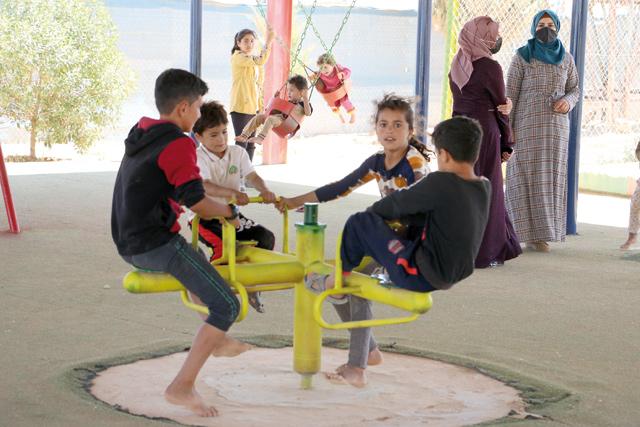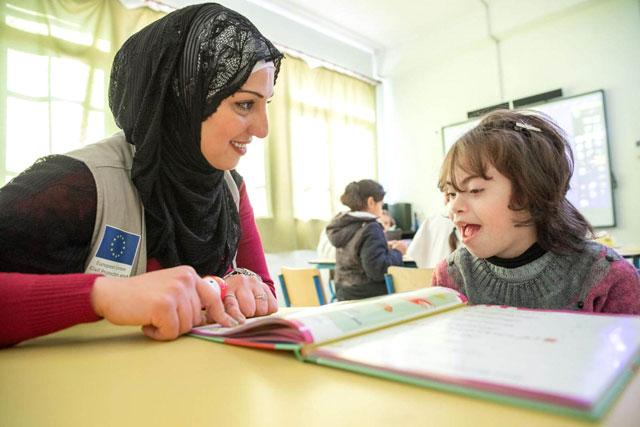You are here
Mercy Corps resumes support programmes in Zaatari, Azraq camps after pandemic pause
By JT - Jul 08,2021 - Last updated at Jul 08,2021

Mercy Corps said its programmes in camps are helping parents in improving their relationships with their children, their neighbours and the local community at large, and reduce their profound stress amidst exacerbated socioeconomic conditions (Photo courtesy of Mercy Corps)
AMMAN — Mercy Corps has resumed its support programmes in the Zaatari and Azraq refugee camps after more than a year of pause due to the COVID pandemic, according to a statement from the international humanitarian organisation.
For over a year, the Zaatari and Azraq camps have been under lockdown to limit the spread of the COVID-19 pandemic. The lockdown and restriction on movements imposed by the government had negatively affected all aspects of life for Syrian refugees, including urgent medical needs, education, social gatherings and recreational activities for children and youth, the statement said.
Most face-to-face service delivery to camp residents has been suspended since March 2020, Mercy Corps said.
The pandemic has caused an alarming increase of livelihood risks since the majority of the refugees work in informal jobs and depend on daily wages for creating a living for themselves and their dependent family members. A recent study conducted by Mercy Corps revealed 62 per cent of families in Zaatari camp were not always able to secure their families’ basic needs, the statement said.
Children’s education has been interrupted tremendously with the shift to online education; not all families are capable of covering their multiple school-aged children’s need for mobile devices and Internet; this is due in part to the weak Internet connection in the refugee camps besides families’ limited economic resources to sustain this need.
Moreover, the COVID-19 pandemic has left a tremendous negative impact on the mental health and family relations of camp residents, especially on female caregivers, the statement said.
Feelings of intense fear, anxiety and extreme anger prevailed among male and female caregivers for prolonged weeks. According to Mercy Corps’ recent study, 46 per cent of the caregivers in both camps reported feeling so afraid that nothing could calm them down as a result of the stress they experienced. Fifty-eight of camp residents reported that family relations have been negatively affected as a result of COVID-19.
Early June, the government of Jordan started to gradually loosen restrictions on movements for the majority of sectors including recreational and sports centres, provided that health precautions are strictly followed by these centres and their visitors. Life began to resume as sector after sector were allowed to reopen.
With these long-awaited changes for restriction on movement and permission for assembly, Mercy Corps and its programme participants are relieved to be able to resume its psychosocial, mental health and family strengthening activities in both Zaatari and Azraq camps with 50 per cent capacity according to government regulations.
On June 21, 2021, Mercy Corps’ ISHRAK Project reopened its centres through in-person programme sessions in Azraq and Zaatari camps.
The programme team set their plan for disseminating the good news for participants and started scheduling the specific sessions for different age groups of the family members.
Psychosocial support programmes that have resumed include Family Superhero, Young Mothers, Brave Hearts, WISE Girls, Filmmaking, Cultural Heritage, and Sibling Support for Adolescent Girls in Emergencies.
For each activity Mercy Corps hosts 10 participants per session through three main activities in Azraq and five in Zaatari camp. Priority is given to the children and youth due to the difficulties in reaching out to them remotely. Furthermore, a health focal person is assigned for each site to ensure that health protocol is applied.
Musab Ahmad Al Rifae, ISHRAK site supervisor with Mercy Corps in Azraq Camp, said: “The community in general is in urgent need for psychosocial support — particularly with the COVID pandemic effect.”
Rifae added: “Through Mercy Corps programmes, which provide psychosocial and mental health support for all age groups, I observed that many participating families in Mercy Corps activities ask us to increase the number and intensity of sessions provided due to the great benefit they offered in alleviating families’ stress points during lockdown periods, including across all aspects of our lives.”
Mercy Corps programmes in camps are helping parents in improving their relationships with their children, their neighbours and the local community at large, and reduce their profound stress amidst exacerbated socioeconomic conditions. Mercy Corps also provides access to education for children with disabilities, concluded the statement.
Related Articles
AMMAN — Through Mercy Corps’ Ishrak programme, more than 2,000 families in the Zaatari refugee camp are to receive hygiene kits, with the ai
AMMAN — Ali Yang, the new Taipei Economic and Cultural Office Representative in Jordan on September 21 visited the Mercy Corps Jordan office
AMMAN — As COVID-19 and the resulting restrictions affected almost every corner of society, including education, children with disabilities

















